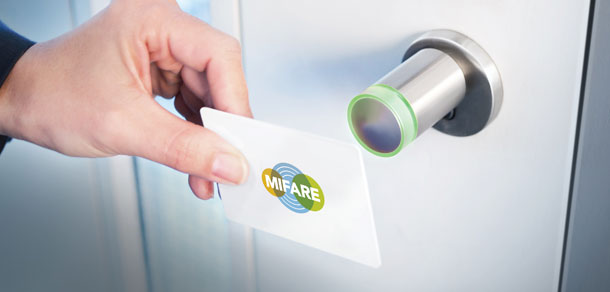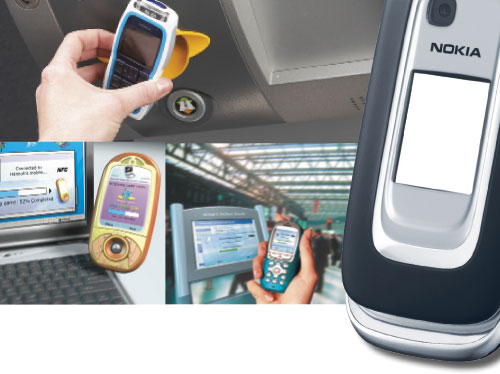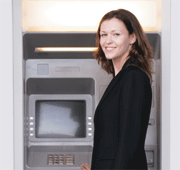Today’s contactless cards do more than just open doors
Real-world deployments reveal range of secure services
28 July, 2014
category: Contactless, Corporate, Library, NFC, Smart Cards
By Rainer Lutz, Senior Global Marketing Manager Access Management, NXP Semiconductor
What do college students, business travelers, sports enthusiasts and visitors of theme parks have in common? They’re all using contactless smart cards to do more than just open doors. In fact, they’re using multi-application smart cards to make purchases, personalize their experiences and access loyalty programs.
Smart cards have become the chameleons of the ID world, adapting to new applications and providing new levels of service, security and flexibility. A quick look at some real-world use cases – two universities, a hotel, a sports arena and two theme parks – gives proof that contactless technologies have moved well beyond physical access control to become cross-market powerhouses.
Campus Cards: Villanova University & the University of San Francisco
More than 1,500 universities are using contactless smart cards, based on NXP’s MIFARE ICs, to provide a range of services. Two such examples are Villanova University, near Philadelphia, and the University of San Francisco. Both have well-established smart card programs that combine building access with payment services using technology from The CBORD Group and Allegion. Now, both institutions are moving to extend their conventional, card-based systems to a mobile service that uses near field communication.
A key point about MIFARE is that NFC technology works with it right out of the box. Any pre-installed MIFARE readers communicate with NFC-enabled phones the same way they do with a MIFARE smart card. To verify this and test the transition to NFC-based services, Villanova and the University of San Francisco ran similar pilots.
They used a hardware sleeve, provided by Wireless Dynamics, to convert a non-NFC equipped iPhone into an NFC-capable device. Pilot participants launched an app that was provisioned with a cloud-based credential and then, with the credential securely in place, tapped the phone against a reader. At both schools, the majority of participants preferred using their phone instead of a badge and found that the NFC-based approach was both convenient and secure.
Moving card-based services onto a mobile device gives students one less thing to carry – or forget – and adds the option of a display interface for more advanced interactions. Over-the-air provisioning and management of digital keys simplifies the administration of access control, since students can be authorized access privileges without making a special trip to campus or waiting in long registration lines. Students are also drawn to the use of new technology, which can benefit a school when it comes attracting the best talent.
In general, educational institutions can use contactless technologies to support more than 20 applications in four categories:
- Secure ID: time and attendance, educational services, exam registration, logical access to PCs and online courses, etc.
- Access management: residences, dining halls, classrooms, IT centers, gyms, performing-arts centers, libraries, etc.
- Cashless micropayment: meal plans, vending machines, print services, laundry, books, parking, etc.
- Mobility services: public transportation, car sharing, bike rentals, etc.
The result is a safe, essentially cash-free campus that lets students, teachers and staff focus on the work at hand.
Boutique Hotel: Marriott Brooklyn Fairfield
In recent years, Brooklyn has earned a reputation for being one of the trendiest boroughs in New York, rivaling Manhattan for gourmet eateries, one-of-a-kind shopping and special places to stay. The Marriott Brooklyn Fairfield – a boutique hotel with 133 rooms – installed a MIFARE-based access system, supported by a software platform to give guests an added level of convenience and security.
The locking hardware is small and sleek, fitting right into the hotel’s modern style, and is easier to use than bulky locks that use traditional keys or magnetic cards. Hotel guests don’t have to fumble with a traditional key, and don’t have to worry about a magnetic card being accidentally deactivated by their smart phone. The supporting software system lets hotel staff assign and revoke pass privileges from a central computer and makes it possible to view the previous 600 access attempts on any given hotel lock so activity can be verified if there is a guest dispute.
Contactless smart cards can help on a larger scale, too. Global hotel corporations like Marriott, Hilton, Intercontinental and Hyatt have properties all over the world and need to manage access to millions of rooms in dozens of countries. They also have loyalty programs with millions of members.
Contactless technology can support members with services that keep them coming back. For example, members might launch a booking app on their NFC smart phone with a tap from the company’s smart loyalty card. Location-based guidance could help find the closest property, and over-the-air provisioning could deliver a room key and parking access, eliminating the need to wait in line for check in.
Once they arrive at the hotel, members could then use their smart phone or their loyalty card to gain special access to the gym or spa, pay for minibar items or purchase a meal in the restaurant. Every transaction can earn loyalty points, and points can be redeemed onsite at any time.
Sports Arena: Washington Nationals Baseball
Baseball is America’s national pastime, so it seems fitting that the Washington Nationals – the major-league baseball team for the nation’s capital – use an advanced smart card scheme. Season ticket holders receive the “Ultimate Ballpark Access” card, a MIFARE-based smart card that is a ticket, a loyalty card and a payment card all rolled into one.
Cardholders have quick, contactless access to the venue, so there’s less waiting at the gate. Moments after entering the park, they receive a welcome message via email or text, along with an offer for a free hot dog. They get a 15% discount at the team store, and can use the Access card for payment as well.
Cardholders also get special treatment at concession stands. They can use dedicated eCash lines, where smart card transactions are processed many times faster than in traditional cash or credit lines. Overall, the scheme enables a closer relationship between the team and its fans.
Theme Park: Trans Studio World
Indonesia is now home to two of the world’s largest indoor theme parks, Trans Studio Bandung and Trans Studio Makassar. The two locations attract large crowds on a daily basis, and use smart cards – based on MIFARE DESFire – for entry tickets, on-site shopping and payment of road tolls and parking fees.
Visitors to the parks conduct transactions faster, with higher security and fewer chances for fraud or human error. The card system also provides park operators with valuable insights into customer behavior and preferences, making it possible to develop more customer-oriented programs. The positive experience extends beyond the park, too, as visitors can use the cards to make purchases at retail outlets in the surrounding area.
Miniature cities
All the places described in this article – universities, resorts, stadiums, theme parks – are essentially cities in miniature, with unique populations and a specific set of requirements. In each case, contactless smart cards are making the people who spend time in these micro-cities feel more secure, more appreciated and more at home.




